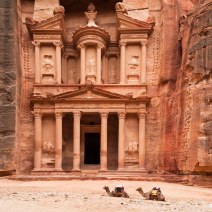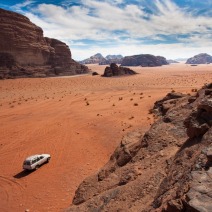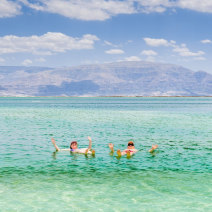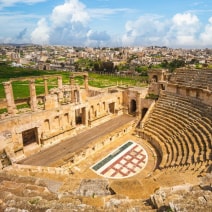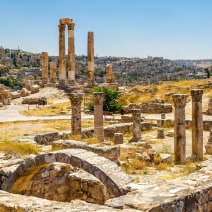Jordan Travel Guide
Jordan, an Arab nation on the east bank of the Jordan River, is defined by its ancient monuments, nature reserves and seaside resorts. It is home to the famed archaeological site of Petra, the Nabataean capital dating to around 300 B.C. Set in a narrow valley with tombs, temples and monuments carved into pink sandstone cliffs, Petra has earned its nickname, the “Rose City.”
With a population of around 11 million, Jordan’s official language is Arabic, though English is widely understood, particularly in cities. Jordan offers remarkable variety, from the desert landscapes of Wadi Rum to the Roman ruins of Jerash, with the Dead Sea providing the unique experience of floating effortlessly in its mineral-rich waters. The capital, Amman, combines modern vibrancy with deep historical roots. Renowned for its warm hospitality, Jordan is very inviting, and this blend of natural wonders and cultural heritage makes the country an unforgettable destination.
We’ve outlined some general information that may be helpful to you when planning your next holiday to Jordan.

Time Zone & Currency in Jordan
Jordan is two hours ahead of Greenwich Mean Time (GMT) throughout the year. The currency is the Jordanian dinar.

Weather in Jordan
Jordan has a hot, dry climate characterized by long, hot, dry summers and short, cool winters.

Reading For Your Trip To Jordan
Married to a Bedouin by Marguerite van Geldermalsen
Lawrence of Arabia by Jeremy Wilson
Leap of Faith: Memoirs of an Unexpected Life by Queen Noor
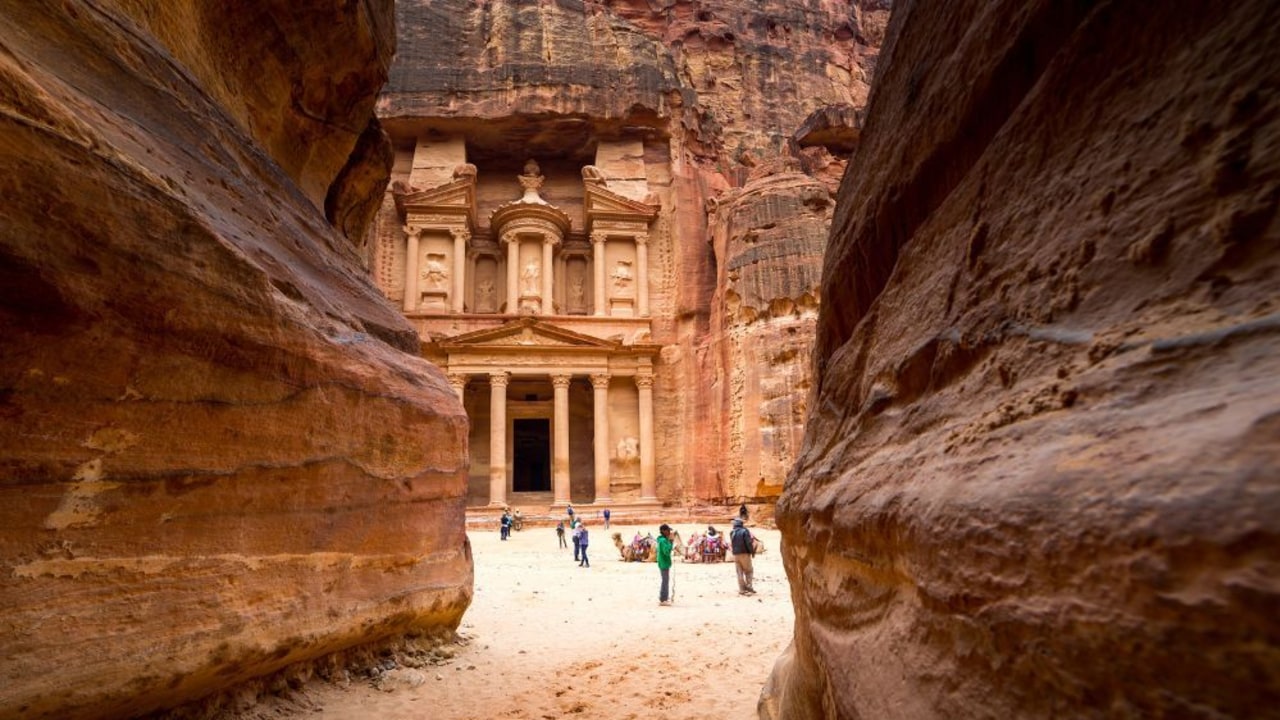
Best time to go to Jordan
While Jordan is a year-round destination, we travel in April, June, September and November when the weather is pleasantly warm and comfortable for exploring. These months fall in the spring and autumn seasons, offering excellent conditions for sightseeing and outdoor experiences.
Top Tourist Attractions In Jordan
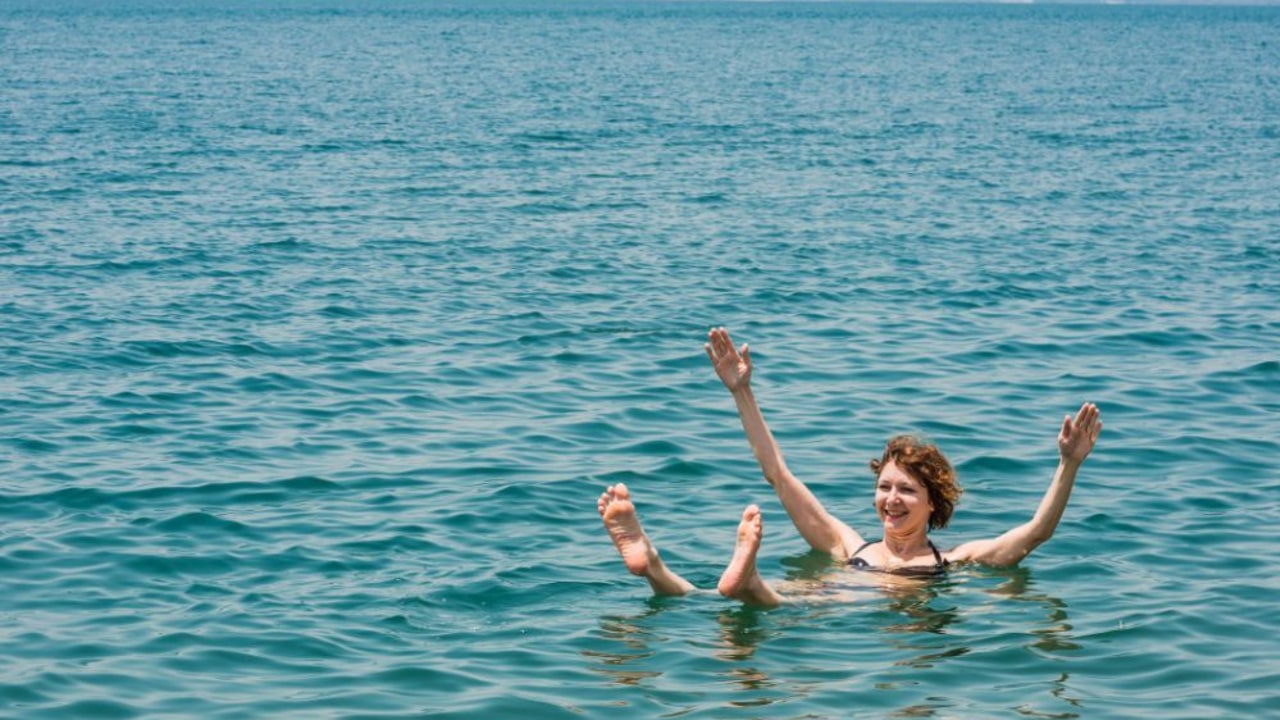
Top 10 things to do in Jordan
From exploring ancient wonders to experiencing breathtaking desert landscapes and relaxing by the Dead Sea, Jordan offers unforgettable experiences for every traveller.
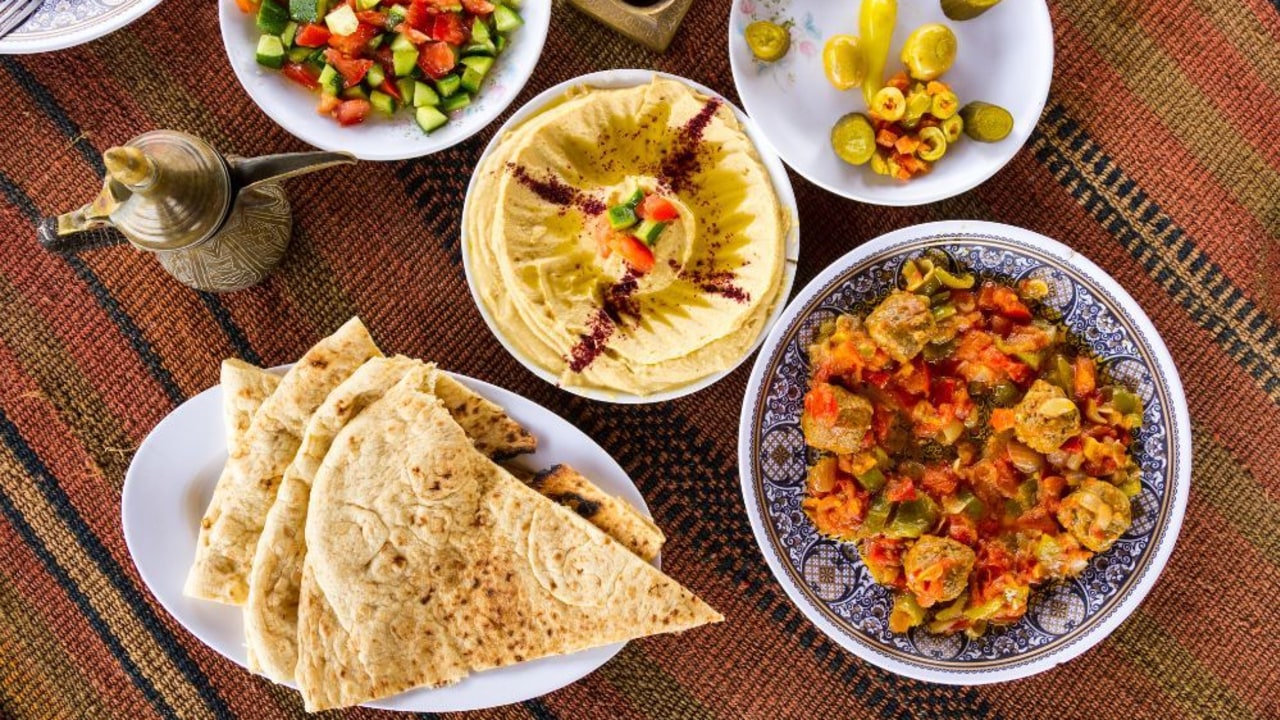
Food and drink in Jordan
Jordanian cuisine is rich and varied, with dishes influenced by Bedouin traditions, Levantine flavours, and Mediterranean heritage. Some must-try dishes include:
- Mansaf: Jordan’s national dish, made with lamb cooked in a sauce of fermented dried yoghurt (jameed) and served with rice.
- Maqluba: A layered dish of rice, vegetables, and meat, flipped upside down before serving.
- Falafel: Deep-fried chickpea balls, golden and crispy, often served with hummus, salad, or fresh bread.
- Knafeh: A popular dessert of shredded pastry soaked in syrup and layered with melted cheese or cream.
- Shawarma: Thin slices of marinated meat, roasted on a vertical spit and served in flatbread with garlic sauce and pickles.
Food in Jordan is often served as mezze, a variety of small dishes shared among family and friends. Meals are accompanied by freshly baked flatbreads, olive oil, herbs, and spices such as sumac and za’atar. Traditional drinks include Bedouin tea flavoured with sage or mint, Arabic coffee with cardamom, and the refreshing Mint Lemon (Limonana). Alcohol is available in Jordan, particularly in international hotels, restaurants and bars in Amman and tourist areas.
Jordan Travel Guide FAQs
Can you give a brief history of Jordan?
Jordan’s history stretches back thousands of years, with ancient civilisations such as the Nabataeans, Romans, Byzantines, and Umayyads leaving their mark through monuments, cities, and trade routes. The most famous site is Petra, the Nabataean capital carved into rose-red cliffs around 300 B.C. The land also features in biblical history, with landmarks such as Mount Nebo and the Jordan River. In later centuries, Jordan became part of the Ottoman Empire until the early 20th century. Following the First World War and the fall of the Ottomans, the Emirate of Transjordan was established under British mandate. In 1946, Jordan gained full independence as the Hashemite Kingdom of Jordan, led by King Abdullah I.Since independence, Jordan has built a strong national identity and is celebrated today as a stable and welcoming nation in the Middle East. Known for its rich cultural heritage, warm hospitality, and role as a crossroads of history, it offers visitors an experience that is both inspiring and unforgettable.
Is Jordan safe?
Yes. Jordan is considered one of the safest countries in the region and is sometimes called the “Switzerland of the Middle East” thanks to its peaceful reputation and good relations with its neighbours. The areas on your itinerary are safe, and our guides will always be there to look out for you. As with any destination, it is sensible to remain vigilant. In larger cities there may be opportunists or pickpockets, so take care at busy tourist sites and keep your personal belongings secure. Make use of your hotel safe, carry a photocopy of your passport when exploring, and exercise caution when using public transport.
Do I need a holiday visa for Jordan?
If you are a citizen of the EU or the United Kingdom and hold an EU or British passport there are no other requirements for entry other than having valid passport for at least 6 months after your planned departure date. A visa will be issued upon arrival.
Can you drink the water in Jordan?
Tap water in Jordan is not drinkable. It is recommended that travellers to Jordan carry their own reusable water bottle.
Can you get alcohol in Jordan?
Even though Jordan is largely a Muslim country, drinking alcohol is not a social taboo; it is available in restaurants and hotels in large cities. There are also bars in tourist areas and some of the major cities particularly those with a significant Christian community. Bear in mind alcohol is heavily taxed and prices on menus do not often include tax levy.
What clothes should I wear in Jordan?
Out of respect for local customs and religious traditions, it is best to dress conservatively, particularly when visiting religious sites such as churches and mosques, as well as during city tours of Amman.
- Summer: Light, breathable clothing such as a cool t-shirt and loose-fitting trousers is recommended. Shorts are acceptable in many tourist areas, but longer clothing is more appropriate in conservative settings.
- Spring & Autumn: A warm jacket or sweater will keep you comfortable, especially in the evenings.
- Winter: A thick, waterproof jacket is advisable as temperatures can drop and rain is common.
Regardless of the season, sun protection is important. Bring sun cream, sunglasses, and a wide-brimmed hat. A sturdy pair of walking shoes is also essential, as you’ll likely spend time exploring on foot.
Jordan Travel Information
- For up-to-date information regarding entry into Jordan please see: www.dfa.ie
- Official Jordan Tourism Board: www.visitjordan.com
